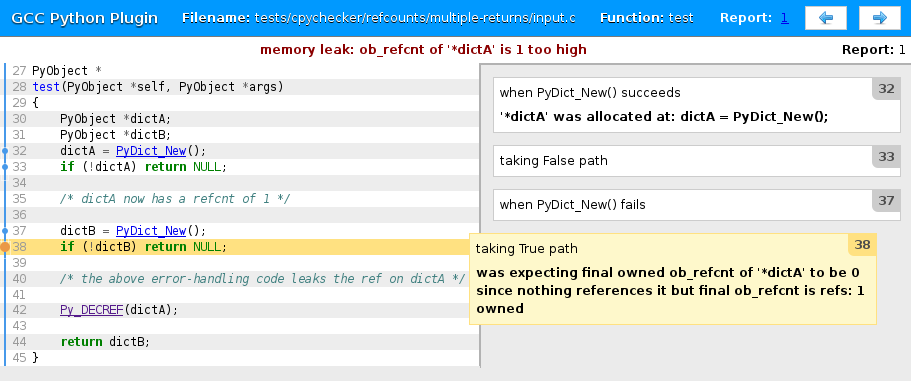0.13¶
The major features in this release are:
- gcc 4.9 compatibility
- a major revamping to the HTML output from gcc-with-cpychecker
New dependency: lxml. The new HTML output format uses lxml
internally.
Changes to the GCC Python Plugin¶
GCC 4.9 compatibility¶
This release of the plugin adds support for gcc 4.9 (along with continued support for gcc 4.6, 4.7 and gcc 4.8).
Building against 4.9 requires a GCC 4.9 with the fix for GCC bug 63410 applied.
Other fixes¶
- fixed a build-time incompatibility with Python 3.3.0
- various internal bug fixes:
- bug in garbage-collector integration (https://bugzilla.redhat.com/show_bug.cgi?id=864314)
- the test suite is now parallelized (using multiprocessing)
- improvements to Makefile
- improvements to documentation
- add gcc.Location.in_system_header attribute
Improvements to gcc-with-cpychecker¶
The major improvement to gcc-with-cpychecker is a big revamp of the output.
A new “v2” HTML report is available, written to SOURCE_NAME.v2.html
e.g. demo.c.v2.html:

The new HTML report is easier to read in the presence of complicated control flow. It also include links to the API documentation for calls made to the CPython API.
For both old-style and new-style reports, the wording of the messages has been clarified:
Reference-count tracking messages now largely eliminate the
0 + N where N >=gobbledegook, since this was confusing to everyone (including me). Instead, error reports talk about references as owned vs borrowed references e.g.
- “refs: 1 owned”
- “refs: 0 owned 1 borrowed”
resorting to ranges:
refs: 0 owned + B borrowed where 1 <= B <= 0x80000000only where necessary.
Reports now add
memory leak:andfuture use-after-free:prefixes where appropriate, to better indicate the issue.Objects are referred to more in terms the user is likely to understand e.g.
*dictArather thanPyDictObject.
The checker also reports better source locations in its messages
e.g. in the presence of multiple return statements
(https://fedorahosted.org/gcc-python-plugin/ticket/58).
Other improvements¶
- Add a new test script: tests/examples/find-global-state, showing examples of finding global state in the code being compiled.
- handle
PySequence_DelItem() - fix bug in handling of
PyRun_SimpleStringFlags() - fix issue with handling of
PyArg_ParseTuple()(https://fedorahosted.org/gcc-python-plugin/ticket/50) - although we don’t model the internals of C++ exceptions, fix things so
we don’t crash with a traceback in the absense of
-fno-exceptions(https://fedorahosted.org/gcc-python-plugin/ticket/51)
Contributors¶
Thanks to Buck Golemon, Denis Efremov, Philip Herron, and Tom Tromey for their contributions to this release.